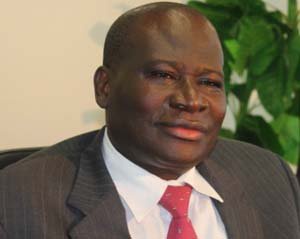The largest power producer in the country, the Volta River Authority (VRA), is to partner one of the renowned power production companies in Europe, the Électricité de France -- otherwise known as EDF, to carry out the second phase of the Kpone Thermal Power Plant Project.
EDF is a French electric utility company largely owned by the French government.
Kirk Koffi, Chief Executive Officer of the VRA, told the B&FT that his outfit is in serious negotiations with the EDC for execution of the KTPP project’s second phase.
"EDF of France came to talk to us. We are having serious discussions with them -- we have even signed a memorandum of understanding (MoU) with them. That is one of the options. If we cannot do it because of certain constraints, we can still get partnerships with people who have the financial muscle and can bring on more generation."
"A lot of power producers want to enter the Ghanaian power market and most of them would like to partner VRA. We are trying to pick and choose the best," he said.
The first phase of the Kpone Thermal Power Project (KTPP), sited at Kpone in the Tema Metropolis, is expected to bring on-stream an additional 220megawatts of thermal power when it is completed by December, to augment what is currently being generated.
The VRA intends to do a steam add-on to generate an additional 110MW as part of the first phase.
The second phase of the project, for which the VRA is engaging the EDF in discussions, is expected to be a gas-based power generation installation that will likely generate about 300megawatts.
Ghana’s electricity sector for the past weeks has been plagued by persistent outages due in part to the shortage in gas supply from Nigeria via the West African Gas Pipeline, because of a strike action by petroleum and gas workers in Africa’s most populous nation.
The situation led to a halt in power generation by the 200MW gas-reliant Sonun-Asogli Power Plant and other VRA plants that depend on gas for production. The situation led to an unprecedented shedding of some 500 megawatts of power last week.
Resumption of gas supply from Nigeria over the weekend led to a relatively improved situation, with power distributor Electricity Company of Ghana (ECG) cutting its load-shedding to about 300MW.
ECG has subsequently released a load-shedding timetable to guide consumers. Based on the time-table, consumers are to expect a 14 hours of power outage between 6am and 8pm local time during the days they are scheduled to go off.
According to the schedule, peak load shedding will be between 6pm and 6am local time.
The precarious situation of relying on Nigeria’s gas for power generation has again brought to the fore the urgency of bringing on-stream Ghana’s gas by completing the country’s first gas processing plant.
The contractual volume that Ghana is to take delivery of from Nigeria is 120million standard cubic feet. However, given the local demand in Nigeria, it has been virtually impossible for the NGas to supply the required contractual volume.
Total demand in Nigeria is about 1.6 billion standard cubic feet of gas while the total gas production is about one billion -- hence, there isn’t enough for Nigeria’s domestic market.
The country’s gas processing plant has taken longer than expected. The project, which is to process 150 million standard cubic feet of raw gas per day from oilfields off-shore Cape Three Points, is now scheduled to be complete by end of the year.
Click to view details



Business News of Wednesday, 24 September 2014
Source: B&FT
VRA to tap French thermal power technology
Entertainment
















